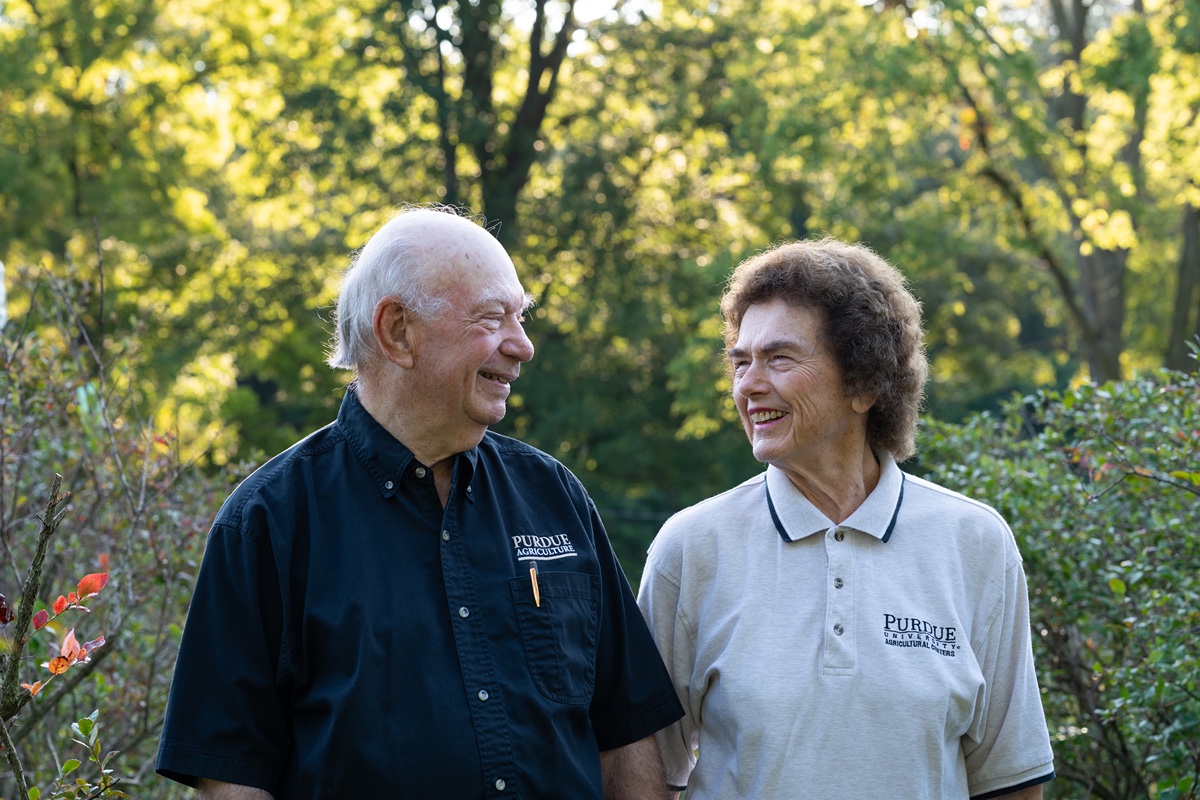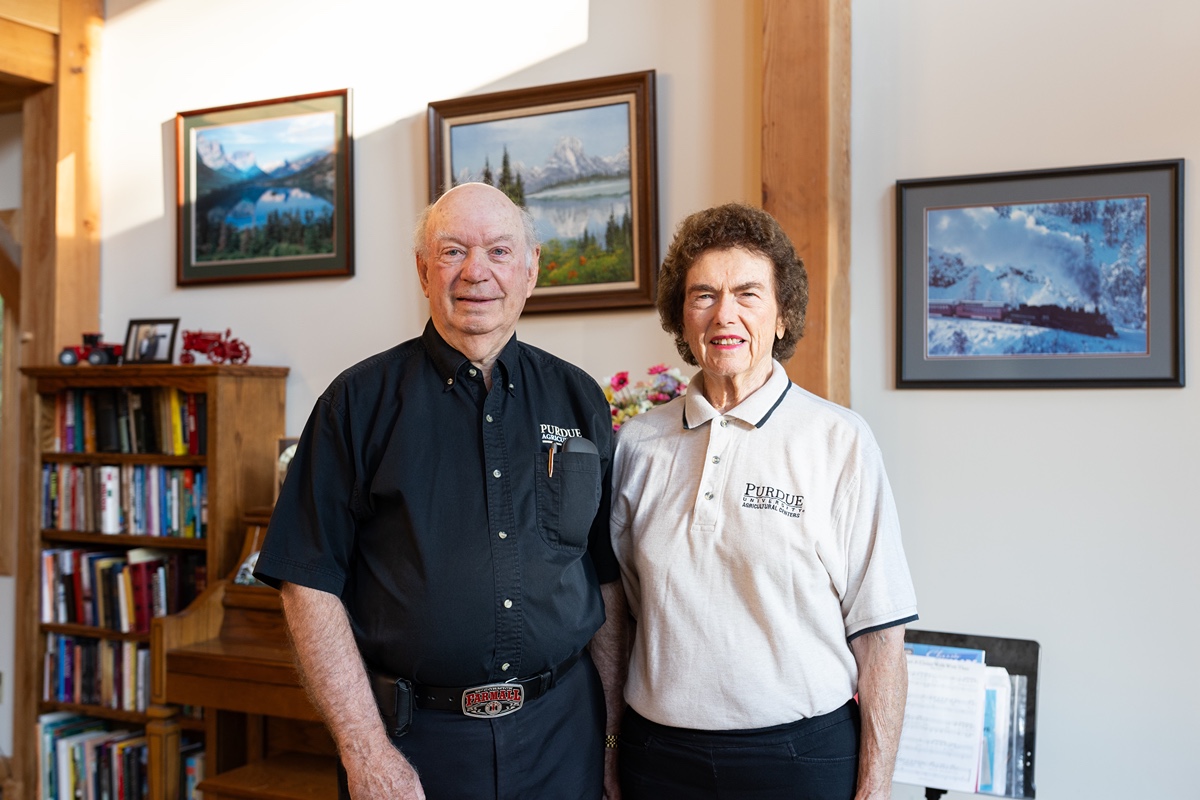“Purdue just became home”: Martins endow two faculty chairs in agricultural economics
A couple of years ago, Marshall and Berdine Martin were asked to speak to students at the Illinois high school he graduated from more than 60 years ago. Each gave a brief overview of their distinguished careers. ”Our message was, ‘We’re a couple of kids that came from farm families in this rural area. We've had a wonderful life. This is where we were nurtured by teachers, by parents, by pastors, by the community.’"
Purdue, too, is key in their story. The Martins came to West Lafayette as married graduate students and stayed as influential members of the faculty and staff.
Now these longtime supporters of the College of Agriculture are continuing their legacy with two new faculty chairs: the Berdine Martin Food Economics Early Career Professorship in Agricultural Economics; and the Marshall Martin Agricultural Science and Technology Policy Early Career Professorship in Agricultural Economics.
The endowed chairs are the first in the college designated for early to mid-career faculty. The Martins hope they will help retain young, high-quality faculty and support activities to ensure their success at Purdue.
The couple grew up about 30 minutes apart on Illinois farms. They met through the Methodist campus ministry at Iowa State University, where Marshall earned his undergraduate degree in agricultural economics, and Berdine graduated in home economics with a focus on nutrition.
They shared values that would be the foundation for 58 years of marriage (so far). “We grew up in families that concentrated on helping other people,” Berdine says. “We were both active in our churches.”
After marrying in 1966, both were eager to follow the example of Berdine’s relatives who had served as missionaries. Marshall had applied to the still-new Peace Corps, but volunteers were required to be single. The Methodist Church offered a novel opportunity for the married couple to go overseas together. In the late fall of their senior year at Iowa State, they were notified of a need for an agriculturalist and a nutritionist in Bolivia.
“And so in May 1966 we finished our undergraduate work, I helped my father get the corn crop planted, the next weekend we got married, we went into overseas training for a month, and we left the country for almost five years,” Marshall says.
They went first to Costa Rica for intensive Spanish language training. At a Methodist school in rural eastern Bolivia, Marshall taught vocational agriculture and was director of a K-12 school of 400 students. Berdine developed a vocational home economics program to address severe child malnutrition in the area.
She recalls that early in their assignment, a little boy in a poor rural village crawled into her lap. “He was very small, and his arms were like sticks,” she says. “I thought he was about 2. It turned out he was between 5 and 6. The moment I held him, I knew I had to focus the rest of my career on nutrition.”
“All they wanted to do was help us,” she adds, recalling the generosity of the villagers. “And I’m thinking, we have to incorporate any education and assistance that we can to help this village survive — to focus on agriculture and food and the economic stress that they were under.”
“We realized as we reached our final year, we wanted a graduate education,” Marshall says of their experience in Bolivia. “While undergraduate education was important, there was more we wanted to know to help farmers and rural people.”
While they were exploring graduate programs, Marshall received a friendly, persuasive letter from the head of agricultural economics at Purdue. “He clearly sent a message, ‘We want you here,’” Marshall recalls. He would remember and apply that personal approach in his own interactions with students.
The Martins began graduate studies at Purdue University in 1971. Both completed master’s and doctoral degrees: Marshall in agricultural economics, in 1972 and 1976; and Berdine in foods and nutrition, in 1972 and 1986, after a break from academia when the Martins’ two children were young.
“That was a challenge,” Marshall says of Berdine’s return to Purdue to complete her PhD. “But she had that can-do attitude that ‘I’m going to make this work,’ and at a time when there weren’t that many women PhD students.”
Marshall’s doctoral research took the couple to Brazil in South America for 18 months. He then joined Purdue’s agricultural economics faculty in 1976.
He taught agricultural policy, price analysis and agricultural business courses; conducted research on agricultural technology adoption; and led Extension efforts focused on agricultural, trade and biotechnology policy. From 2000 until he retired in 2020, he was the senior associate director of agricultural research and graduate education and assistant dean.
His work has taken him around the world to teach at universities, speak at conferences, guide agricultural delegations and conduct research in more than 25 countries. During his career, he compiled a long list of service to the college and professional organizations and awards that reflect his dedication to the three pillars of the land-grant mission.
Examples include the Hovde Award for Service to Rural Indiana, Special Boilermaker Award from the Purdue Alumni Association, Certificate of Distinction from the Purdue Ag Alumni Association, Book of Great Teachers, and an Honorary Master Farmer from the Indiana Prairie Farmer and College of Agriculture.
Berdine joined the laboratory of Connie Weaver, distinguished professor emerita in nutrition science, in 1986 as a senior research scientist and lab director. There she used a broad array of laboratory research skills and tools in her work on calcium bioavailability, metabolism and bone health. Her research was the basis for over 200 publications and research abstracts and many invited lectures. Research in this lab is the basis for USDA calcium dietary recommendations. Upon her retirement in 2019 Berdine was inducted into the Purdue Department of Nutrition Science Hall of Fame.
Through their professional pursuits and the community around them, “Purdue just became home,” Marshall says.
The Martins previously endowed undergraduate scholarships in their respective departments. Other gifts have strengthened experiential learning such as study abroad and undergraduate research in the college, and they are avid supporters of the Purdue University Jazz Band and Convocations. They have established a Murchison Scholarship between the College of Agriculture and Black Hawk College in Galva, Illinois which is located on the farm where Marshall’s paternal grandmother was born and raised.
They also have contributed to nonprofit and community organizations. Marshall summarizes their philanthropic themes using the acronym FARM — family, agriculture, religion and music.
The Martins decided to stay close to their Purdue “home” in retirement. Marshall served as general contractor for the timber-frame, energy-efficient house they built on their blueberry farm just north of West Lafayette. There they frequently welcome guests and groups, allowing Berdine to practice her culinary skills.
Marshall is president of the Purdue University Retirees Association, chairs the board of Ag Alumni Seed and is on the executive committee of the Indiana Crop Improvement Association. Berdine continues to be involved in various community and regional efforts focusing on food security, nutrition and child health. Both are leaders in their church, and they enjoy swing music and dancing.
The couple has two children and four grandchildren. Their daughter Melanie Dodd is associate dean for clinical affairs and professor at the University of New Mexico College of Pharmacy and recently elected President of the American Society of Health-System Pharmacists with over 60,000 members. She is a Purdue pharmacy graduate who met her husband in the jazz band. Their son Matthew Martin holds a Purdue MBA and is chief marketing officer for the Harris Teeter 260-store grocery chain owned by Kroger and located in the Carolinas and Virginia.
Thinking about the future recipients of their endowed chairs inspires optimism in Marshall and Berdine Martin.
We hope that they understand the importance of agricultural and food economics for the survival of the world population. We hope they are creative, and academically prepared to take a risk with new programs and technological discoveries in agricultural and food economics."
- Marshall Martin
“We hope both chairs break down the silos of academia, bringing faculty from different departments to work together. Increasingly the challenges in our world are multidisciplinary and complex.”
“Hopefully we’ve planted a seed,” he adds. “We hope this is the beginning of a journey for the college.”








